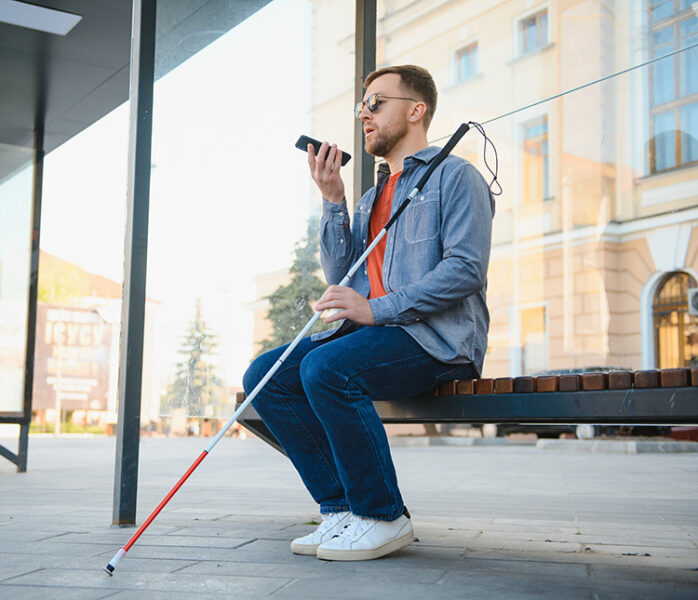You can live well with Stargardt disease
As Stargardt disease progresses and affects your vision over time, know that you can make adaptations, find community, and empower yourself throughout your journey so that you can do almost anything.
Stargardt Fact Sheets to Share and Print
To live successfully with low vision, maximize the vision you have.
Low vision specialists are trained to help a patient with vision loss learn how to use their remaining vision to its fullest potential. Find a vision rehabilitation center so you can learn how to maximize the use of the vision do have to help you work, do daily activities, and do the things you enjoy. This can include:
- Improved lighting techniques, such as adding extra lighting for activities like reading, making meals, or other close work.
- Use of accessible technology, such as smart phones, tablets, VR, computers, smart homes.
- Use of low-tech solutions, such as magnifiers or simple home modifications.
- Find a vision rehabilitation center near you.
Talk to your loved ones.
Talk about how you are feeling and describe how you see. It will help your family and friends understand what you can and cannot see as they are part of this journey with you. Share with them how they can help you with your vision loss and the support needed from schools and employers. Talk to them about your emotions about your change in eyesight and how you can manage together, and keep having this conversation as vision needs change.
Connect with a local organization.
There are community organizations that provides services and support for people who have vision loss or are blind. Every state has a department of rehabilitation supported by the National Council of State Agencies for the Blind.
Support services include:
- vocational rehabilitation (including job retraining)
- mobility training
- evaluation for assistive technology devices
- individualized counseling.
Local support services can be found at NCSAB.org or VisionServeAlliance.org.
A variety of organizations supporting individuals with an IRD can be found at ASharedVision.org.
Complete genetic testing.
This provides your eye care team with the most detailed diagnosis and allows them to recommend the best possible treatment for your specific IRD. Genetic testing is also often a requirement before a patient can participate in clinical trials.
Learn more about IRDs and benefits of genetic testing.
Find a provider to help you access genetic testing.
The Foundation Fighting Blindness’s list of Retina Doctors makes it easy to find a genetic testing specialist or health care provider in your area of the United States who can discuss your testing options and assist you in learning more about your IRD.
Advocate for yourself!
Stargardt disease is not common. It can be normal for healthcare providers not to be familiar with it. Stay informed of your condition, talk to your doctor, and share resources.
How can Stargardt disease affect mental health?
Stargardt disease can cause loss of vision. For some, loss of vision can lead to feelings of depression, anxiety, and loss of independence. Not everyone who has vision loss will experience depression or anxiety. Some individuals may notice a change in their desire to socialize with others, or increased frustration with the additional time it may take to accomplish tasks of daily living. If you do experience any of these symptoms, know there is help available.
To help support your mental health as you deal with Stargardt disease:
Talk to your primary care doctor, mental health professional, or eye doctor.
Talk to your doctor about any changes to your emotional wellbeing. Ask your eye doctor questions on how Stargardt disease will affect your daily life and work. Seek assistance on how to deal with the changes in your life due to Stargardt disease.
Seek support.
Look for support groups of others who are experiencing Stargardt disease. MD Support provides a list of support
groups near you on their website. These groups can help you learn about your condition, share your experience, and find support.
Connect with others and the things that bring you joy.
Stay connected with friends and family to keep you from feeling isolated. Over time, you can find new ways to do the things you love or to discover new hobbies that bring you happiness.
Exercise
Staying active can help symptoms of depression or anxiety and make you feel better. Talk to your health care professional to determine what exercise routine may work best for you, especially if you have changes to your vision due to Stargardt disease.
Seek vision rehabilitation.
Ask your eye doctor to recommend a low vision specialist. The specialist can help to maximize the use of the vision you have.
For More Stargardt Disease Information and Resources:
Prevent Blindness – Stargardt Disease
National Eye Institute – Stargardt Disease
Foundation Fighting Blindness – Stargardt Disease
Bradford Manning, Founder of Two Blind Brothers, Teaches Stargardt Disease


